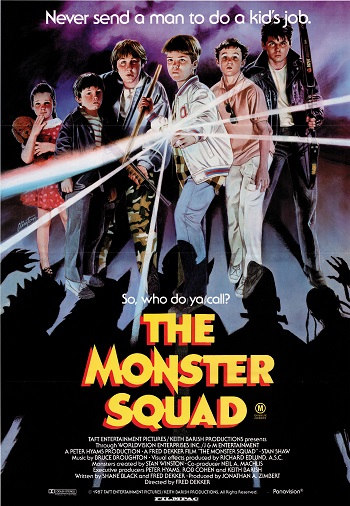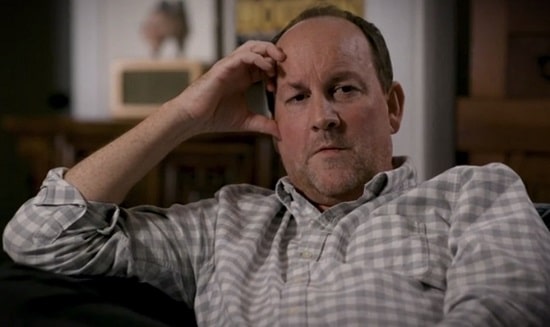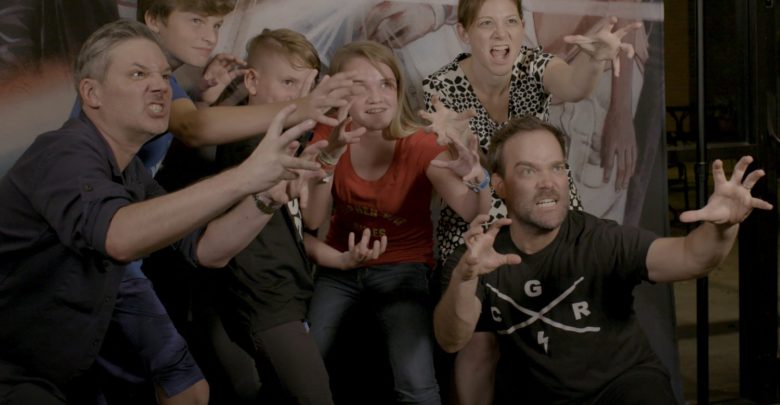 The Monster Squad holds a distinctive and relatively unique position in horror fandom. Released in 1987 back when it was still pretty early days for the PG-13 certificate, it was a box office bomb, and neither its director nor the bulk of its cast went on to do much of note. However, as with a great many films that initially failed to find an audience theatrically, its reputation grew with time thanks to home video and cable television, and in the late 1980s/early 1990s it became a major gateway movie for a generation of viewers just discovering horror. And yet, by the mid-2000s The Monster Squad seemed to have been forgotten, until an impromptu screening in Austin and an ensuing wave of fan interest online saw it granted a DVD release, just in time for the 20th anniversary. Eleven years on from that, The Monster Squad seems to be widely embraced as a bona fide 1980s classic – although for whatever reason, it’s still failed to get a DVD or Blu-ray release in the UK (come on distributors, surely one of you can sort this out).
The Monster Squad holds a distinctive and relatively unique position in horror fandom. Released in 1987 back when it was still pretty early days for the PG-13 certificate, it was a box office bomb, and neither its director nor the bulk of its cast went on to do much of note. However, as with a great many films that initially failed to find an audience theatrically, its reputation grew with time thanks to home video and cable television, and in the late 1980s/early 1990s it became a major gateway movie for a generation of viewers just discovering horror. And yet, by the mid-2000s The Monster Squad seemed to have been forgotten, until an impromptu screening in Austin and an ensuing wave of fan interest online saw it granted a DVD release, just in time for the 20th anniversary. Eleven years on from that, The Monster Squad seems to be widely embraced as a bona fide 1980s classic – although for whatever reason, it’s still failed to get a DVD or Blu-ray release in the UK (come on distributors, surely one of you can sort this out).
In Monster Squad Forever, the retrospective documentary that was produced for the 2007 DVD, writer-director Fred Dekker – who had made only one film beforehand in 1986’s Night of the Creeps, and one film thereafter in 1993’s RoboCop 3 – wistfully ponders whether it might ultimately be better to have made one or two films that mean a lot to a select group of people, rather than a whole bunch of films that loads of people have seen but no one really cares about. This is the big thing that comes up time and again with The Monster Squad: those who really love the film tend to have an intensely personal, emotional connection to it.
I hasten to add that I myself am most definitely one of those people. I’ve written at length about this before (and not just the once) so I’ll keep it brief here, suffice to say that I credit The Monster Squad with establishing my love of horror, and to this day it remains my all-time favourite movie. Even so, I was as taken aback as anyone to discover in the late 2000s that others felt this way, although this revelation clearly had a greater impact on Dekker and his now fully grown cast of middle school monster hunters, who have spent much of the past 11 years bouncing between conventions and fan screenings all over the shop. Inspired by this widespread interest, and perhaps following the lead of fellow former child actor Michael Stephenson (star of Troll 2, and later director of acclaimed documentary Best Worst Movie), The Monster Squad’s lead actor Andre Gower has stepped behind the camera for Wolfman’s Got Nards, a full length exploration of the film, its production, its commercial failure, and its subsequent fandom.
Of course, anyone who’s seen Monster Squad Forever (a very in-depth talking heads affair whose running time exceeds that of the film itself) may question the need for another documentary on the subject. However, Gower not only has an extra decade of fandom to draw on, he also manages to sit down with a number of key figures the earlier doc missed, the most notable being co-writer Shane Black, who of course wound up the biggest success story to come out of The Monster Squad, having also written the considerably more successful 1987 movie Lethal Weapon. The arrival of this documentary is in some ways quite timely, as this summer sees Black and Dekker (ha ha, that never gets old) reunite on The Predator, this time with the roles reversed: Black directing, Dekker writing. It’s nice to finally see Black reflect on his earliest experience of screenwriting, particularly as, like just about everyone involved, he looks back on it with considerable affection.
 When I say just about everyone… for anyone who loves The Monster Squad as much as I do, there may well be a particularly bittersweet tang to Fred Dekker’s contributions to Wolfman’s Got Nards. The director is rather less guarded here than he was in Monster Squad Forever; where before he had gently hinted at problems with executive producer Peter Hyams, here he declares outright that Hyams came close to getting him fired in the first week of production. However, things get rather closer to the bone when Dekker contemplates his own feelings about the film all these years later, for while he seems sincere in declaring it his best film and appreciating the fandom it enjoys, he also makes it clear that it’s not all happy memories for him. After all, the film’s commercial failure killed his career overnight, and his one subsequent film RoboCop 3 only served to hammer the last nails in (although he also helmed a pretty good Tales From The Crypt episode in the interim). I know I’m not alone in lamenting the fact that Dekker was never able to enjoy the high profile directing career he was clearly capable of, and as such one can hardly blame him for his mixed feelings.
When I say just about everyone… for anyone who loves The Monster Squad as much as I do, there may well be a particularly bittersweet tang to Fred Dekker’s contributions to Wolfman’s Got Nards. The director is rather less guarded here than he was in Monster Squad Forever; where before he had gently hinted at problems with executive producer Peter Hyams, here he declares outright that Hyams came close to getting him fired in the first week of production. However, things get rather closer to the bone when Dekker contemplates his own feelings about the film all these years later, for while he seems sincere in declaring it his best film and appreciating the fandom it enjoys, he also makes it clear that it’s not all happy memories for him. After all, the film’s commercial failure killed his career overnight, and his one subsequent film RoboCop 3 only served to hammer the last nails in (although he also helmed a pretty good Tales From The Crypt episode in the interim). I know I’m not alone in lamenting the fact that Dekker was never able to enjoy the high profile directing career he was clearly capable of, and as such one can hardly blame him for his mixed feelings.
Of course, one rather significant question about Wolfman’s Got Nards is whether viewers who are not Monster Squad fans themselves are going to care either way, and this is one aspect of Gower’s film that I’m left uncertain about. It does seem to be geared primarily towards those who already know and love The Monster Squad: there are in-jokey nods to the film’s ‘rivalry’ with The Goonies, and the significance of its title is pretty much left unexplained. Still, hopefully the film presents an accessible enough vision of fandom and the passion it inspires that those on the outside can still relate.
In any case, existing Monster Squad devotees are sure to appreciate the personal reflections of the cast and crew, as well as those of a number of prominent fans including Seth Green (who, it’s mentioned, had his first ever movie audition for a role in the film), Joe Lynch, Adam Green and various others. There are also likely to be a few tears shed for the section devoted to Horace actor Brent Chalem, who died in 1997.
Wolfman’s Got Nards screened on 24th June at the Music Box Theatre in Chicago, as part of Cinepocalypse 2018. Warped Perspective thanks the festival for allowing us an advanced preview.
